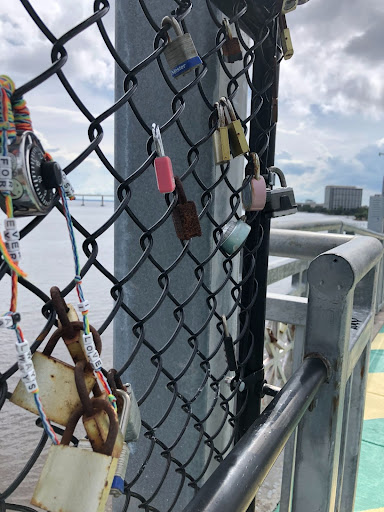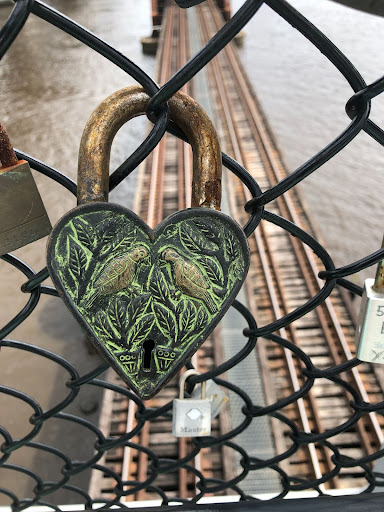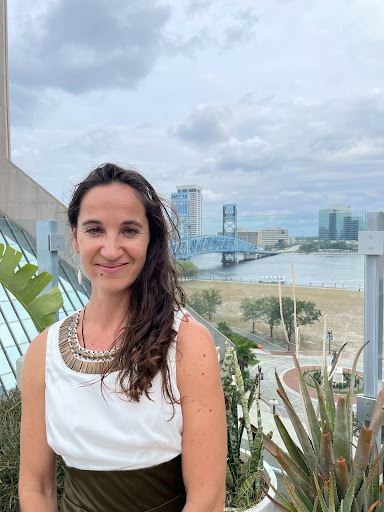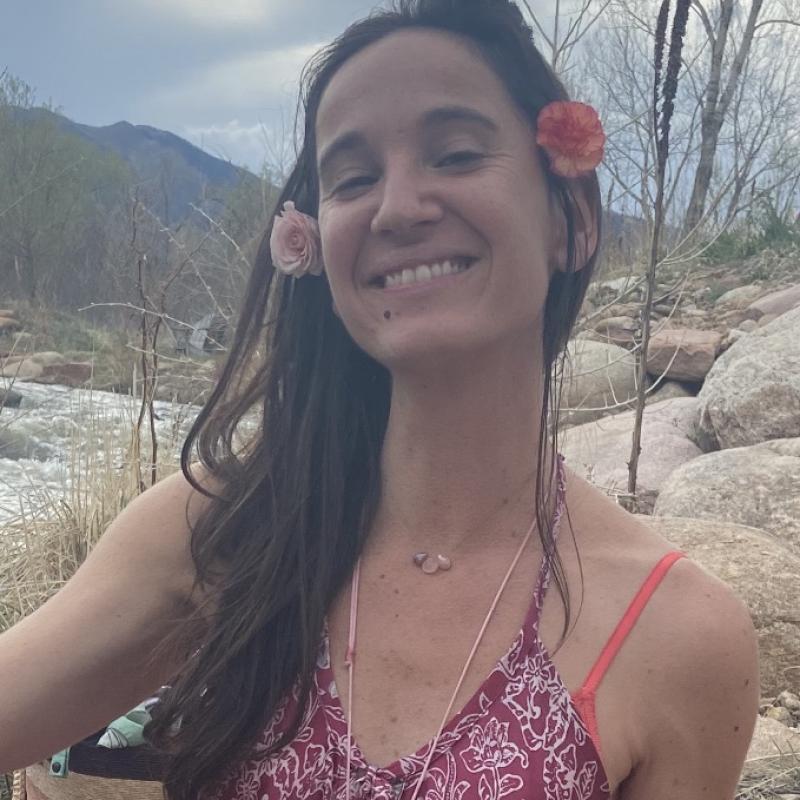 There is a bridge in Jacksonville filled with locks. These many locks hang on a steel fence looking out on the beautiful glistening St Johns river. Questions emerged, “Where are all the keys?” “Who has access to the keys?” and “Who does not?” As I looked out over the bridge I saw the shimmer and warmth of the sun on the vast waters. In contrast I also saw the fence that seemed to entrap, as though a cage, toward a road with no opportunity or growth, just mere locks.
There is a bridge in Jacksonville filled with locks. These many locks hang on a steel fence looking out on the beautiful glistening St Johns river. Questions emerged, “Where are all the keys?” “Who has access to the keys?” and “Who does not?” As I looked out over the bridge I saw the shimmer and warmth of the sun on the vast waters. In contrast I also saw the fence that seemed to entrap, as though a cage, toward a road with no opportunity or growth, just mere locks.
I began to see this bridge as a symbol of access to resources - those that have access to the keys that unlock all those locks and those who do not. And it is intended that way. During my service, I came across many of these locks and barriers. For those holding control, power, wealth and resources, there is a huge benefit to keeping access limited, unavailable to the global majority. By design, those who are unable to access even a mere portion of those resources, including clean water, food, shelter, education, employment and endless opportunities, are left with no keys in hand.
Through my experience of giving back in service with the National Health Corps in Jacksonville, FL, after 15 years of a career of somatic body-based therapy, the learning curve has been steep, challenging, on-the-ground, real. As a woman who worked with personal clients for many years then turning toward public health and social services, time and again I was inspired, devastated, encouraged, disappointed and hopeful.
Often encountering gaps in the system, I have contemplated leadership styles through my contract and service with the NHC, along with the dynamics of power and access. This experience has been eye opening, primarily to witnessing how nonprofits function with varying leadership styles, and how institutions often wield power.
 A unique situation unfolded. Through unforeseeable circumstances, I was given the opportunity/challenge to serve with two distinct organizations. In the first, I saw the dynamics of an unsupported system: those on the ground level (a team that was small but mighty) were receiving very little support from higher-ups to leverage the immensity of the needs of the program. I saw that true groundwork demanded grit, dedication, commitment, and an immense amount of overtime while getting paid a fraction of their worth. Unfortunately communication and relationship with leadership was fiercely lacking and nearly non-existent. There was a sense of what I would call Competitive Leadership. Power and status/status quo often seemed more important than the utter complexity of the services, of communicating challenges, and finding creative solutions and generating resolutions.
A unique situation unfolded. Through unforeseeable circumstances, I was given the opportunity/challenge to serve with two distinct organizations. In the first, I saw the dynamics of an unsupported system: those on the ground level (a team that was small but mighty) were receiving very little support from higher-ups to leverage the immensity of the needs of the program. I saw that true groundwork demanded grit, dedication, commitment, and an immense amount of overtime while getting paid a fraction of their worth. Unfortunately communication and relationship with leadership was fiercely lacking and nearly non-existent. There was a sense of what I would call Competitive Leadership. Power and status/status quo often seemed more important than the utter complexity of the services, of communicating challenges, and finding creative solutions and generating resolutions.
“Cultural Responsibility” is foundational in any organization, unless misused. Bullying can become a power play with leadership treating those on the ground often with disrespect while using a tone of hollow integrity and power dynamics to intimidate. How do we track accountability and bullying when those who are high up the ladder are no longer in contact with the ground level and people they are serving?
I had the opportunity to experience the opposite in Leadership styles as NHC Florida director and COO became involved in an interpersonal-institutional conflict. They spoke to all parties separately and together, asked diligent questions, encouraged dialog as well as solution-based approaches while also looking at personal responsibility. I also witnessed how they each stood in their principles of integrity around real open communication, directness, fostering relationships and mutual respect while asking each of us to look at our own part in the situation. Ultimately, I stayed through this trying situation experiencing a level of right use of power, as I witnessed a Principle-based Leadership style.
I had the opportunity to transfer over to a small nonprofit organization of nearly 20 years, with a focused demographic and honed-in program. The mission, vision and objectives were clear. Questions were welcomed and embraced to strengthen rather than to threaten. A genuine breath of fresh air. I was able to experience what I would term Empowered Leadership. This is where each woman was uplifted to be a mentor drawing from her own life experiences seen as an expert in her own right. Words of praise and encouragement were spoken often, while at the same time direct feedback was given in what needed to shift. The framework being “empowered women empower women”. This was immensely rewarding to be part of. For me, the culmination ending on a high note.
 How do we know when to step forward? When do we bring our voice and our ideas? When do we keep quiet and follow what is already established? Will we be received? Will we be shut down or even shamed? These are all very real possibilities in the face of institutions, nonprofits, hospitals, universities and status quo.
How do we know when to step forward? When do we bring our voice and our ideas? When do we keep quiet and follow what is already established? Will we be received? Will we be shut down or even shamed? These are all very real possibilities in the face of institutions, nonprofits, hospitals, universities and status quo.
Meanwhile, we serve the people and health equity.
I return to the image of the bridge of locks. In certain ways, we all have the responsibility (the ability to respond) to find more access, more of these keys. During this service term, and in life in general, we will confront these dynamics: choosing our battles, stepping forward, stepping back, bringing voice, and other times going along with the flow. If we are born into some level of privilege, it becomes a mandate to wrestle with power dynamics at times, even when it is uncomfortable and we do not know the outcome. And yet learning to do so in right-relationship, with support, with guidance from your director (at NHC) and/or organizational supervisors local or National to address these issues of systemic health/oppression is what is being asked of us. Depending on the leadership style this may illustrate the way to proceed. While there will be challenges and opportunities for growth, your input and insight matter, and ideally it will be deep and long lasting. The service is rich and is worthy of finding the essence of YOUR keys, your voice and your passion - as we have the ability to find and unlock resources in and for the community through this opportunity of Service.
Host Site
431 University Boulevard North
Jacksonville, FL 3221
431 University Boulevard North
Jacksonville, FL 3221

